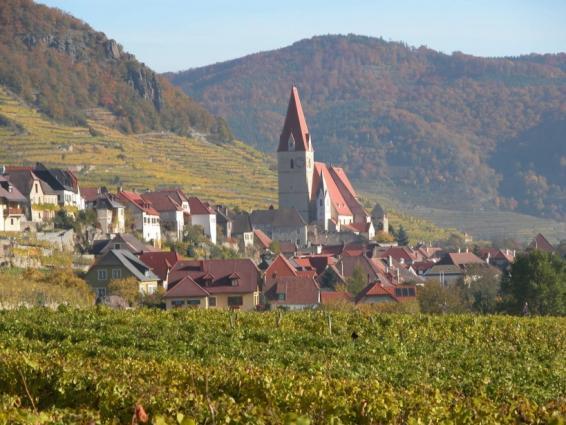Prager
Steinriegl Riesling
Prager
Steinriegl Riesling
Franz Prager, co-founder of the Vinea Wachau, had already earned a reputation for his wines when Toni Bodenstein married into the family. Bodenstein’s passion for biodiversity and old terraces, coupled with brilliant winemaking, places Prager in the highest echelon of Austrian producers.
Federspiel is a designation of ripeness for dry wines, a term used exclusively by members of the Vinea Wachau. Federspiel wines must be unchaptalized and fall between 11.5 and 12.5% ABV. The grapes are hand-harvested, typically in October, and are sent directly to press where they spontaneously ferment in stainless-steel tanks.
Steinriegl is planted to Riesling and is Prager’s only vineyard west of Weißenkirchen. The exceptionally steep, southwest-facing site has a cool mesoclimate due to its proximity to the forest, and its soil is a unique “kalksilikatmarmor,” a limestone silicate marble rarely found elsewhere in the Wachau. Bodenstein produces both an earlier-picked Federspiel and a later-picked Smaragd.
Tasting Notes
Austrian Riesling is often defined by elevated levels of dry extract thanks to a lengthy ripening period and freshness due to dramatic temperature swings between day and night. Steinriegl’s uniquely cool microclimate results in wines of high aroma and focused acidity and its limestone soil provide compact structure and a flavor that is distinctive among Wachau Rieslings.
Food Pairing
Riesling’s high acidity makes it one of the most versatile wines at the table. Riesling can be used to cut the fattiness of foods such as pork or sausages and can tame some saltiness. Conversely, it can highlight foods such as fish or vegetables in the same way a squeeze of lemon or a vinaigrette might.
Franz Prager, co-founder of the Vinea Wachau, had already earned a reputation for his wines when Toni Bodenstein married into the family. Bodenstein’s passion for biodiversity and old terraces, coupled with brilliant winemaking, places Prager in the highest echelon of Austrian producers.
Federspiel is a designation of ripeness for dry wines, a term used exclusively by members of the Vinea Wachau. Federspiel wines must be unchaptalized and fall between 11.5 and 12.5% ABV. The grapes are hand-harvested, typically in October, and are sent directly to press where they spontaneously ferment in stainless-steel tanks.
Steinriegl is planted to Riesling and is Prager’s only vineyard west of Weißenkirchen. The exceptionally steep, southwest-facing site has a cool mesoclimate due to its proximity to the forest, and its soil is a unique “kalksilikatmarmor,” a limestone silicate marble rarely found elsewhere in the Wachau. Bodenstein produces both an earlier-picked Federspiel and a later-picked Smaragd.
Tasting Notes
Austrian Riesling is often defined by elevated levels of dry extract thanks to a lengthy ripening period and freshness due to dramatic temperature swings between day and night. Steinriegl’s uniquely cool microclimate results in wines of high aroma and focused acidity and its limestone soil provide compact structure and a flavor that is distinctive among Wachau Rieslings.
Food Pairing
Riesling’s high acidity makes it one of the most versatile wines at the table. Riesling can be used to cut the fattiness of foods such as pork or sausages and can tame some saltiness. Conversely, it can highlight foods such as fish or vegetables in the same way a squeeze of lemon or a vinaigrette might.




